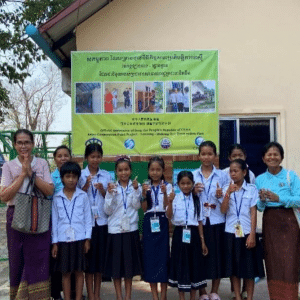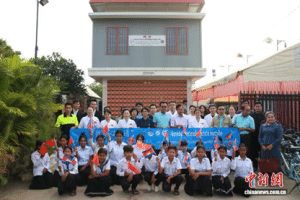BACKGROUND
On the afternoon of November 18, 2024, the side event titled “Lessons and Experiences Sharing on Transitions from Coal: Case Studies of Coal Regions” took place during the 29th Conference of the Parties to the United Nations Framework Convention on Climate Change (COP29). Organized by the Shanxi Coshare Innovation Institute of Energy & Environment (Coshare) in collaboration with Agora Energiewende and the Gansu Green Camel Bell Environmental Development Center, the event aimed to facilitate sustainable and equitable decarbonization transitions in coal regions. Experts from various countries shared best practices and insights on just transitions, drawing on case studies from Shanxi and Inner Mongolia (China), Poland, Latin America, Kazakhstan, and the Philippines. Representing Green Camel Bell, research assistant Yang Keyue presented the “Indigenous Peoples’ Declaration on Responding to Climate Change,” highlighting the critical need to include Indigenous voices in the just transition process.
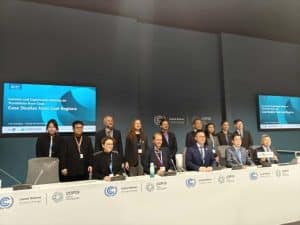
Group photo of participating guests
Global Practice Sharing for Just Transition in Coal Regions
In the opening speech, Prof. Huang Zhen, academician of the Chinese Academy of Engineering and director of the Institute of Intelligent Energy Research of Shanghai Jiao Tong University, highlighted China’s establishment of a “1+N” policy framework. This system supports the achievement of the country’s Nationally Determined Contribution (NDC) goals through a series of implementation programs across various sectors and industries, It aims to drive systematic change in development models, industrial structures, energy systems, and social attitudes. Prof. Huang emphasized that China is undergoing an unprecedented green energy transition from fossil fuels to renewable energy sources. Achieving the “dual carbon” goals will require tremendous effort, along with continuous reflection on how to transform the energy structure and advance the green transition.

Side Event Moderator: Mr. Tu Jianjun, President of Agora Energiewend from China
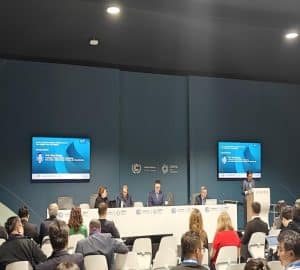
Speech by Huang Zhen from the Chinese Academy of Engineering
In his speech, Dr. Dirk Messner, Director General of the German Environment Agency, highlighted Germany’s efforts to strengthen its renewable energy supply since 2015. These efforts include the development of wind power stations, solar photovoltaics and a grid system designed to support renewable energy infrastructure. He emphasized the critical role of public and private investment, as well as innovative development frameworks, in achieving a just transition. Dr. Messner also noted that the German government has actively restructured its investment strategies to facilitate the equitable transformation of coal regions.
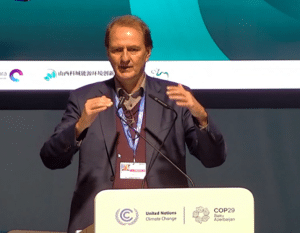
Statement by Dr. Dirk Messner, Director General of the German Environment Agency (UNEP)
Keynote Speech: Sharing of Transformation Practices in Central European Coal Regions
By Prof. Yuan Jin from Shanxi Province, China
Prof. Yuan Jin, Chairman of the Coshare, shared the recent achievements and challenges of energy transformation in Shanxi Province. As a pilot province for comprehensive energy reform, Shanxi is committed to increasing the share of non-fossil energy consumption to 12% by 2025 and further to 18% by 2030. In pursuing a just transition, the province has prioritized job placement, the development of replacement industries, ecological restoration, and financial support. These efforts focus on four key areas: new energy, new industries, a renewed environment, and improved quality of life, resulting in significant progress.
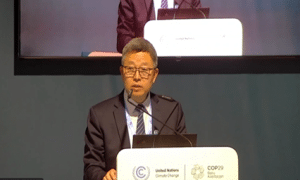
Keynote Speech by Prof. Yuan Jin, Chairman of the Coshare
To advance a fair and just green, low-carbon transition, Prof. Yuan Jin proposed addressing both the employment and funding. This includes enhancing the inclusiveness of economic development policies, expanding market-driven employment opportunities, and establishing re-employment platforms for coal workers. Additionally, he emphasized the importance of securing special funds for a just transition and encouraging financial institutions to innovate their financial products to strengthen the integration of finance with just transition initiatives.
By Dr. Joanna Makowiak-Pandera from Europe Poland
Dr. Joanna Makowiak-Pandera, Chairwoman of the Management Board of Forum Energii (Polish Energy Forum), stated that Poland is currently among the fastest-moving countries in the global energy transition. However, its major coal-producing regions face significant social challenges, including high unemployment rate. As the country prepares to assume the EU Presidency next year, the Polish government plans to restructure its energy-related investments to broaden the definition of energy security and ensure that more people benefit from renewable energy.
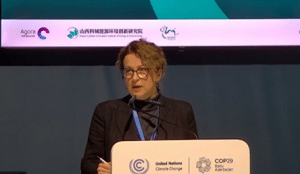
Dr. Joanna Makowiak-Pandera, Chair of the Energy Forum Management Committee
Round-table Discussion: Best Practices and Safeguard Mechanisms for Addressing Climate Change in Different Regions
The roundtable discussion, moderated by Ms. Yang Zhou, Program Director of Local Energy Transition at Agora Energiewende, brought together experts and scholars from the Environmental Defense Association of the Americas (EDAA), Philippine Climate Justice Movement (PCCJM), Environment and Development (ED), Agora Energiewende, Energy Research Institute (ERI) of Peking University, and Green Camelot. They shared their experiences and practices in promoting just transition, climate mitigation, and adaptation in coal regions across Latin America, the Philippines, China, and the United States.
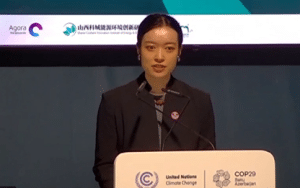
Ms. Yang Zhou, Project Leader of China Local Energy Transition at Agora Energiewende
By A Representative of Climate Mitigation Work from Latin America
Mr. Javier Dávalos Gonpere, External Advisor to the Inter-American Institute for Environmental Defense (AIDA) and Associate Researcher at the Comptons Institute for International Studies (ICEI), highlighted significant progress made by Latin American countries in regulating the authorization and implementation of mining and energy projects. He discussed the ecological challenges posed by the expansion of one of the largest coal mines in Colombia. Mr. Dávalos also emphasized the importance of collaboration between developed and developing countries in leveraging just transition funding. He underscored the need to listen to local communities’ needs and to work collectively to develop and refine criteria for coal mine closure and decommissioning.
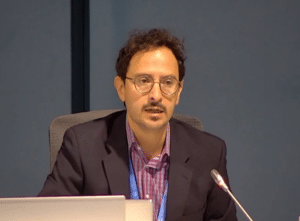
Mr. Javier Dávalos Miyapere, External Advisor, AIDA
By A Representative from Inner Mongolia of China
Dr. Yang Lei, Deputy Director of the Energy Research Institute at Peking University, discussed the university’s collaboration with Inner Mongolia on the energy transition initiatives. He emphasized that public awareness and support are vital for advancing energy transition efforts. Dr. Yang also highlighted the need to explore innovative business models to enhance the economic viability of renewable energy. To address the challenges of a just transition, he proposed strengthening international stakeholder cooperation to support skill development and capacity building for workers in coal regions.
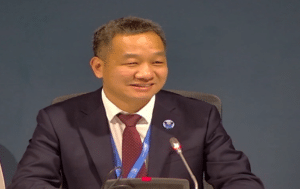
Dr. Yang Lei, Deputy Director, Energy Research Institute, Peking University
By A Representative from Kazakhstan
Dr. Tatiana Ranshina, head of the power system transformation project at the Agora Energiewende, noted that Kazakhstan began developing new energy sources a decade ago, with solar and wind power now accounting for 5.5% of the country’s energy generation. She emphasized the need to establish a dedicated body to coordinate efforts among government departments, coal companies, universities, and social organizations to develop a clear timeline for coal phase-out and related policies. Dr. Ranshina highlighted the importance of diversifying the economies of major coal producing regions, protecting coal workers’ right, assisting them in transitioning to “greener” jobs, and providing appropriate compensation. Additionally, she underscored the need to expand infrastructure, including power grids and energy storage facilities, to support the energy transition.
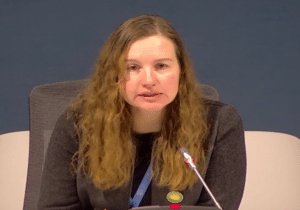
Dr. Tatiana Ranshina, Program Leader, Power System Transformation, Agora Energiewende
By A Representative from the Philippines
Ian Rivera, National Coordinator of the Philippine Movement for Climate Justice, pointed out that the Philippine government lacks a clear plan for decommissioning fossil energy sources. He noted that coal-fired power generation has contributed to the Philippines having some of the highest electricity prices in Asia. Many communities are dissatisfied with the health impacts of coal-fired power plants and have even filed lawsuits in response. In light of this, local government departments with legislative and executive powers have partnered to develop a renewable energy roadmap, along with business and financial models, to support a faster, fairer, and more equitable renewable energy transition in the Philippines.
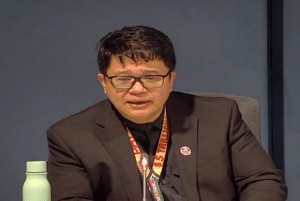
Ian Rivera, National Coordinator, Philippine Movement for Climate Justice
By A Representative from Georgia
Mr. Kakhaber Bakhtadze, Project Manager of Environment and Development (END), discussed the importance of climate adaptation in addressing climate change in Georgia. While the country has already achieved the target of 80% renewable energy in its energy mix, it is heavily impacted by climate change, including natural disasters such as flooding which damages mountainous areas and infrastructure, as well as coastal erosion caused by rising sea levels. These challenges have a significant impact on the lives and property of local populations. Mr. Bakhtadze also shared the climate adaptation experiences of indigenous communities in the mountains, who are working together to slow down erosion. Through the establishment of local management committees, these communities combine traditional knowledge with modern expertise and collaborate with technicians from the capital to address environmental challenges.

Mr. Kahab Bakhtadze, Environment and Development Project Manager
Highlighting Indigenous Voices in Climate Action
During the event, Yang Keyue, a research assistant from the Gansu Green Camel Bell Environmental Development Center, delivered a compelling speech on the Indigenous Peoples’ Declaration on Responding to Climate Change. Yang shed light on the indispensable role Indigenous communities play in shaping global climate strategies, emphasizing their unique contributions and the need to prioritize their inclusion in a just transition. Key points from Yang’s address included:
- Guardians of Biodiversity: Indigenous peoples, representing only 6% of the global population, manage 80% of the planet’s remaining biodiversity. Their profound connection to the land and eco-centric cultural practices offers invaluable insights into sustainable land use and biodiversity conservation.
- Blending Knowledge Systems: Indigenous communities integrate traditional knowledge with modern science to address climate crises. Through workshops, storytelling, and educational initiatives, they strengthen resilience while preserving their cultural heritage.
- Policy and Inclusion: A just transition must amplify Indigenous voices by enacting policies that protect land rights, ensure equitable access to climate resources, and uphold land sovereignty. As Yang stated, “Indigenous knowledge is a cornerstone for global climate solutions and equitable progress.”
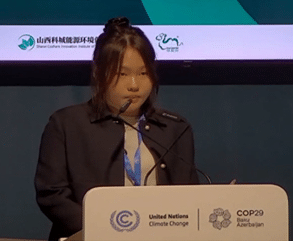
Yang Keyue Green Camelot Research Assistant
By highlighting these points, Yang underscored the vital need to center Indigenous perspectives in climate action for a truly sustainable and inclusive future.
SUMMARY
Yi Chen, Deputy Director of the Climate Works Foundation, concluded the side event by emphasizing its success in uniting diverse perspectives and shared experiences from across the global climate community to accelerate the energy transition in coal regions. The discussions underscored the importance of ensuring fair, equitable, and sustainable development as these regions shift away from fossil fuels toward achieving net-zero emissions by 2050. Yi Chen highlighted that collaboration among all stakeholders—policymakers, industry leaders, think tanks, NGOs, and the public—is crucial for innovating solutions, fostering open dialogue, and raising awareness to build widespread support for the energy transition.
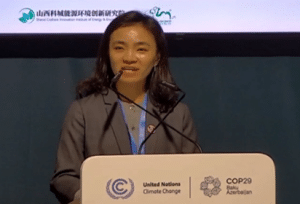
Yi Chen, Deputy Director of Climate Works Foundation
The side event at COP29 showcased the need for a just and inclusive energy transition, with coal regions at its core. Acting as a vital communication platform, it connected regions at various stages of their transition journeys, enabling the exchange of best practices and lessons learned. From Indigenous communities contributing traditional knowledge to policy leaders advocating for collaborative approaches, the event highlighted the need for active, collective participation.
The insights shared will shape region-specific strategies that support coal regions in their transition to clean, sustainable energy. With a focus on reducing emissions, preserving biodiversity, and fostering dialogue, the event reinforced the commitment to leaving no community behind on the path to a net-zero future by 2050.
Looking ahead, Coshare plans to strengthen partnerships and communication with coal regions, develop tailored just transition programs, and play a key role in advancing the global clean energy transition. These efforts will contribute to a more sustainable, equitable, and environmentally conscious future for all.
Yang Keyue is an assistant researcher at Green Camel Bell, a Lanzhou-based NGO.

